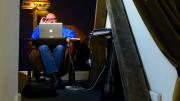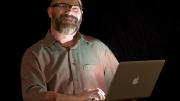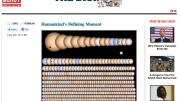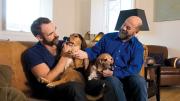It was noon in Washington, D.C., when the shooting began in Tucson. Across the country, reporters and media executives rushed to cover the story of the gunman, the Congresswoman he shot at close range, and the 14 other victims. But the news couldn’t reach one of the Internet’s most important writers. For Andrew Sullivan, M.P.A. ’86, Ph.D. ’90, the editor of a blog called The Dish, the weekend is a time for rest, and having teed up on Friday afternoon a half-dozen evergreen posts for Saturday, he had turned off his communication devices and was sleeping in.
Sullivan had been lightly ill that week, so he slept unusually late, until almost two in the afternoon. Before he was quite ready to deal with the world, he checked his mailbox—and woke up fast. Along with the news of the shooting was an urgent question from readers: Andrew, where are you?
Sullivan winced. He e-mailed his four young assistants: “We have to go cable”—that is, pump out blog posts 24/7. Then he climbed four unpainted wooden steps to what anyone else would call a large windowed closet and he calls “the blog cave.” He pulled a velvet curtain shut to seal himself off from his husband and their beagles, settled into an armchair with his laptop, and began a siege of blogging that would last six days.
Sullivan and his team had worked like this before. During the 2010 protests in Iran, they had scoured Facebook messages, Twitter bleats, Al Jazeera dispatches, and Iranian blog posts. The eclectic charm of the Dish (formerly TheDailyDish)—poems, philosophical and religious speculation, photographs from the windows of readers, the latest Sarah Palin outrage, and videos by The Pet Shop Boys—disappeared. The site became all Iran, all the time, and the Dish quickly became the Web’s go-to site for news and context. In the process, the site’s traffic spiked.
The Dish’s coverage of the Tucson shootings paralleled its Iran coverage. While other bloggers ascribed blame, Sullivan filtered new reports, asked important questions, grieved for the victims—and avoided partisan speculation. Once again, his audience grew.
But this round of blogging was different. Andrew Sullivan is a lifelong asthma sufferer. He has sleep apnea, and at night wears a mask connected to a machine that regulates his breathing. And since 1993, he has been HIV-positive. Although Sullivan isn’t the only writer with HIV to have survived for almost two decades, no other HIV-positive writer publishes anything like 300 blog posts a week, year after year; he needs to monitor his health.
Shortly after the week of Tucson, the Internet’s Iron Man faltered—exhaustion and an unusually cold winter created so much bronchial distress that his doctor ordered him to take to his bed. During his unprecedented two-week silence, governments toppled in the Middle East. While his assistants did great work, friends teased Sullivan: “Andrew, you’re missing an entire revolution.”
When Sullivan returned, he had news of his own—he was leaving the Atlantic website, his home for the last four years, to join TheDailyBeast.com and Newsweek magazine, both edited by Tina Brown. In the traditional media paradigm, it’s a promotion for a writer to move from the website of a highbrow monthly magazine like the Atlantic (circulation: 400,000) and the occasional article for that publication to America’s second-largest weekly news magazine (circulation: 1.5 million) that has just become the partner of a website with five million monthly readers. But when the writer in question has a blog that’s more popular than the websites of many publications, it’s clear that Newsweek/Beast got something equally important in this deal.
“The Dish has twice as many readers as the New Republic and more than National Review,” Sullivan says. And on the Atlantic site, the Dish also ruled. Some days, according to Alexa.com, which measures site traffic on the Internet, the Daily Dish accounted for more than half of the visitors to TheAtlantic.com. In cold numbers: Andrew Sullivan—one blogger, with a small budget and a minimal staff—has presented Tina Brown with a gift of about 1.3 million Internet readers.
Blogging Brahmin
American media have three castes. At the top is “The Village,” a term created by a progressive blogger who calls herself “Digby” to describe a rarefied league of highly paid bold-faced names—think David Brooks, Peggy Noonan, Howard Kurtz—who move easily between print columns and television punditry. In the middle is the working press, a stressed-out group of reporters and columnists employed by increasingly desperate newspapers and magazines; to their daily tasks has been added blogging on their publications’ websites. At the bottom are bloggers.
Most of the Internet’s 150 million blogs serve up highly personal dispatches, the equivalent of those year-end letters that arrive in Christmas cards. Very few of those bloggers post news and views as a primary activity—there’s no money in it. So blogging as a professional journalistic activity really involves at most a few thousand independent writers.
These elite bloggers are serious and knowledgeable, but they are often described as the untouchables of American media—unemployed, unemployable pajama-clad slackers who live with their parents and tap out overwrought screeds on basement computers. That view is not the verdict of critics who have visited the sites of elite bloggers; it’s a media god’s throwaway line. (NBC News anchor Brian Williams, for example: “All of my life, developing credentials to cover my field of work, and now I’m up against a guy named Vinny in an efficiency apartment in the Bronx who hasn’t left the efficiency apartment in two years.”) Beyond a general disdain for the Internet, the reason is often personal—bloggers don’t just write about politicians, they also attack the media. And because media potentates don’t welcome criticism, they lash back.
Andrew Sullivan also moves easily from blogging and print journalism to TV, but his resemblance to the Villagers ends there. For one thing, his views are ever-changing and all over the map; a TV producer can’t count on him to speak for any one constituency. For another, although he has a résumé that qualifies him as a media elitist, he has dramatically redefined his idea of success. At 47, his concerns are no longer those of the overachieving wonder boy he used to be.
Sullivan earned a first-class degree (equivalent to a summa) in modern history and modern languages at Oxford, where, in his second year, he was president of the Oxford Union, the debating body that claims to be “the most illustrious student society in the world.” He won a Harkness Fellowship to the Kennedy School in 1984; back in London, he interned at the think tank of one of his idols, Margaret Thatcher. He returned to Harvard in 1989 to write his doctoral thesis, “Intimations Pursued: The Voice of Practice in the Conversation of Michael Oakeshott,” which won the government department’s Toppan Prize, for the best dissertation “upon a subject of Political Science.” In 1991, when he was just 27, he was named editor of the New Republic; under his leadership, the magazine grew impressively in both circulation and advertising. He left the New Republic five years later, “at the tail end of a series of differences,” says New Republic owner Martin Peretz, Ph.D. ’66. Sullivan moved on to write books and become a contributing writer for the New York Times Magazine and a columnist for the Sunday Times (of London).
To see such precocity is to be mystified—why would a writer with such impeccable credentials cast his lot more with bloggers than with people of his own kind?
“He’s Catholic and gay and an exile,” says the writer and feminist historian Naomi Wolf. “That’s all very helpful—his background forces him not to be confined in any single identity.”
Sullivan is bald, bearded, and bespectacled; in photographs he has an intellectual’s intensity. At the same time, he’s quite adept in social settings, and has immense personal charm. Hendrik Hertzberg ’65, IOP ’85, who knew him in Cambridge and preceded him as editor of the New Republic before joining the New Yorker, recalls Sullivan as “a strikingly beautiful young man…who had to fend off the women with a cricket bat.” David Frum, J.D. ’87, a Harvard colleague who went on to become a speechwriter for George W. Bush, M.B.A. ’75, describes Sullivan as a social powerhouse: “Over drinks, Andrew dazzled a table of teaching assistants with his knowledge of pop bands. We knew nothing, but it wouldn’t have made a difference—we were spellbound.”
The motivation behind Sullivan’s accelerated trajectory and outsized personality is grittier. He may have seemed sophisticated in Cambridge, but he was raised in Sussex by parents who hadn’t gone to college; their marriage was less than happy, and his mother bipolar. “I had to be independent quite early,” he explains, “and I had to get out. The escape was my brain.”
At 11, he commuted three hours a day to attend a school for gifted boys. His protection was his Roman Catholic faith. He’d been an altar boy; now he drew crosses in the margins of his books “to ward off evil” and, in art class, refused to draw anything unrelated to the Bible. His ambition could not have been more conventional—to become a Tory member of Parliament.
Sullivan was 23 when he acknowledged his homosexuality and jettisoned his virginity. Years later, when his byline started to matter, he went public. “Every day, you have to say who you are, or live in fear,” he explains. “I thought, ‘If I do this, I’ll never get to be a Tory MP.’ And I said, ‘Screw it.’ I knew I wanted even more to be happy, have love and sex.”
He had, by his account, a great deal of sex. In 1996, when he revealed he had contracted HIV, a friend asked whom he had unprotected sex with. In Love Undetectable, his 1998 book about “friendship, sex, and survival,” Sullivan writes that he admitted it could have been anyone. His friend was incredulous: “Anyone? How many people did you sleep with, for God’s sake?”
In the book, Sullivan held nothing back. “Too many. God knows. Too many for meaning and dignity to be given to every one; too many for love to be present at each; too many for sex to be very often more than a temporary release from debilitating fear and loneliness.”
That is classic Sullivan: the unsparing candor, the over-sharing, the spiritual afterthought. Three years later, when he started to blog, that kind of writing would become his signature—and, for all its outsider status, the first really comfortable identity he’d known.
Neocon Renegade
When Sullivan launched a website in 2000, he thought of it as nothing more than an archive of his magazine articles. He knew nothing about technology—every time he wanted to add another article, he had to ask a friend for help. Sullivan is a prolific writer; for his friend, this routine quickly grew old. “Do it yourself,” he advised.
Self-publishing was liberating. Under a “Daily Dish” headline, Sullivan started adding short posts. Readers sent suggestions. Soon he was updating his site several times a day; if a blogger is defined as a single writer who regularly posts news and commentary, Sullivan was among the first. And, from the beginning, he was popular; within a year, his request for contributions brought in $27,000.
The creation of a community was thrilling. So was the absence of an editor. But that freedom can be a trap for a writer who prides himself on writing from the heart as well as the intellect. Sullivan made what he has come to consider his first significant, sustained blunder after the attacks of September 11, when he compared antiwar dissenters and liberals to traitors: “the enemy within the West itself—a paralyzing, pseudo-clever, morally nihilist fifth column that will surely ramp up its hatred in the days and months ahead.”
That was the start of a new Andrew Sullivan: a Brit applauding every escalation of White House rhetoric and cheerleading the invasion of Iraq. “I was caught up in emotion,” he says, beginning a monologue that has not become less painful with the passage of years. “We had every reason to be outraged, and I had a desire to match the magnitude of the event with words of the same magnitude. Sending a few Special Forces units to take out a criminal didn’t seem serious enough.”
Toppling a dictator in Iraq did. Sullivan was committed to that idea—even more committed, he says, than his friend Donald Rumsfeld.
“The son of one of Rumsfeld’s closest friends was a friend of mine,” Sullivan says. “We met in a gay bar. That’s how I came to have dinner with Rummy and stay at his house in Taos. He liked to rag me about the blog: ‘You’ve done this for years and made no money. When will you make money?’ And we fought about gays in the military. But when it came to war in Iraq, I was more bellicose than he was.”
Here Sullivan was right in sync with other neo-conservatives. And he stayed in sync until he saw the photographs from Abu Ghraib: “That was the heartbreaker—torture destroyed all moral basis for the war.”
Sullivan’s Catholicism didn’t allow for situational morality. Neither did his boyhood hero, George Orwell. He had made a mistake—“the darkest political misjudgment of my life.” Now he had to pay for it, and because he was a blogger, he had to pay in public.
“When you write as I do, there’s nowhere to hide,” he says. “I had gone so far that I faced a crisis as a writer. So, first, I had to stand up, acknowledge my error, and make a good-faith apology. Then I needed to analyze what went wrong. And that’s when my doubts about neo-conservatism began.”
The institutions that Sullivan believed in disappointed him so greatly during the Bush administration that in 2004, for the first time, he endorsed a Democrat for president. “I’ve met so many gay soldiers I wasn’t aware there were any straight people in the military,” he says, deadpan, but official recognition of gays in the armed forces made no headway in those years. In the ’90s, long before most gay men thought gay marriage was a possibility, Sullivan had been an activist in that cause; he was furious when the president advocated a constitutional amendment defining marriage as a heterosexual partnership only. And as a fiscal conservative, he disagreed with the Bush administration’s enthusiasm for off-the-books funding of expensive wars and medical programs.
But the breaking point was, first and always, torture. In 2006, John McCain—who had once sponsored legislation to ban American military personnel from using torture—abandoned his opposition and supported the Military Commissions Act, which gave the president the right to torture. Sullivan was shattered. “That night, I got on my bike and rode to the Jefferson Memorial,” he recalls. “I didn’t know what else to do. I couldn’t believe America had done this.”
When Andrew Sullivan changes his mind, he often goes from one extreme to another. Not long ago, he was the subject of one of those interviews that, for most, is an opportunity to display some wit and warmth. Sullivan did—to a point. Then the Politico.com interviewer asked: “You’re president of the United States for enough time to make only one executive decision. What is it?” Without hesitation, Sullivan replied: “Announce a full Justice Department investigation into the war crimes ordered by and admitted by George W. Bush and Dick Cheney.”
Relentless Heterodoxy
Andrew Sullivan did not support John McCain in 2008. The torture flip-flop would have been enough of a reason. Then McCain added Sarah Palin to the ticket. The combination of her scant government experience and “raw political talent” terrified Sullivan—and with only two months between her nomination and the election, he started hammering.
“I was told: ‘Don’t touch this, it will hurt your reputation,’” he says. During a campaign when most pundits were, at worst, quizzical about Palin, Sullivan filled his blog with questions she was never going to answer. Did he pay a price? “I have become more of an outlaw in this town because I couldn’t hide my amazement from my peers—I’ve definitely become more alienated from mainstream media.”
Since the election, Sullivan has continued to press for clarification about a rumor the mainstream media won’t touch: that Trig is not Palin’s son. Sullivan hasn’t flung any accusations at Palin; he’s just pounded her ever-changing stories about Trig’s birth, and her unwillingness to provide a birth certificate for him. In the heated conversation that surrounds all things Palin, nuance has been lost—and Sullivan has been cast as a crank who takes pleasure in badgering a woman who may have no political future. His response: “Early on, I figured out that anything I write about her can only help her, but I don’t care about that. The job of a journalist is to find the truth.”
This relentlessness has led to continuing analyses of other issues that most media avoid. Once a strong supporter of Israel, for example, Sullivan came to question its settlements in Gaza. His language is not always temperate: “It staggers me to read defenses of what the Israelis have done. They attacked a civilian flotilla in international waters breaking no law. When they met fierce if asymmetric resistance, they opened fire. And we are now being asked to regard the Israelis as the victims.”
Unsurprisingly, he has provoked others to respond in kind.
A few years ago, Sullivan had a dustup about his Jewish “problem” with Leon Wieseltier, JF ’82, a former colleague at the New Republic and a friend. Wieseltier wrote long, and he wrote harsh, concluding, “And this is not all that is disgusting about Sullivan’s approach.” Asked to comment for this article, Wieseltier wrote back: “Sorry, I’m sick of the subject.”
Martin Peretz takes a longer view: “I’m curiously soft on Andrew. I don’t really understand his attitude toward Israel and Zionism. I hope these turbulent days in the Arab world will help him grasp that the Jews of Israel live in a very dangerous environment and that one can’t contemplate peace treaties here the way they’re contemplated in other regions.”
Sullivan’s impassioned prose is matched only by his willingness to change his mind. When Sullivan supported Barack Obama in 2008, it was the final break with his former allies. Of a dozen prominent neo-conservative writers contacted for this profile, only one responded—to decline. His onetime allies have, however, been quite willing to deride him in their blogs, like Jonah Goldberg, writing in National Review: “Once a voice of restraint and reason, Sullivan now specializes in shrill panic: mercurial ranting full of operatic arguments, steeped in bad faith, aimed at people he once praised.”
Sullivan’s reasoning exasperates his former friends because it’s as much psychological as it is political. “When I read Dreams from My Father, I read it as a gay book,” he says. “That is, Obama discovered he was black at the same age that others of us learned we were gay. The world had no place for him. He had to make a place for himself.”
Sullivan continues to praise Obama, though as a fiscal conservative, he has some grievances with the president—and with everybody else in Washington: “We all know what the Congress should be doing about the debt right now, don’t we? It should be debating which mix of long-term entitlement and defense cuts and the least economically damaging tax increases would lower the long-term debt, restore global confidence in the long-term solvency of the U.S., and thereby ignite more business confidence and job growth.…What do we have instead? A president too calculating to take a stand and an opposition so focused on drastic cuts to discretionary spending and overreaching on collective bargaining that it is already making independents and moderate Republicans queasy.”
Sullivan doesn’t just criticize. He proposes solutions. He dreams of a Republican candidate who is “a real fiscal conservative, socially inclusive, open to serious tax reform and politically adult conversation to regain the center ground.” Currently he is extremely enamored of Indiana’s Republican governor, Mitch Daniels, who is not, as of this writing, a presidential candidate.
“Intellectual Diva”
David Bradley, owner and publisher of the Atlantic, courted Andrew Sullivan for six years. When Sullivan signed on, TheAtlantic.com had 200,000 unique visitors a month—“less than accidental visits to the New York Times,” Bradley says. On the Dish’s first morning, the publisher had his laptop open: “Our traffic grew sixfold in a moment. It was like Hoover Dam had broken—we were awash with traffic.”
Bradley and Sullivan talked frequently and intimately, and in one of those conversations, Sullivan shared a deep truth about himself. “All my life,” he said, “I’ve been disappointed by powerful men.” Bradley took that to heart. “I made a private vow that, whatever happens, I’m not going to be his next disappointment.”
He wasn’t. Sullivan and Bradley had their differences about money—the Dish may have accounted for as much as $2 million in advertising revenue each year, and Sullivan has long wanted a cut—but Bradley says he was quite willing to share equity. The catch: Sullivan would have to broaden the site, so its success didn’t depend only on him. But in the end, the issue really was Sullivan’s innate restlessness.
These days, that restlessness is limited to Sullivan’s professional life. A few years ago, he was in “one of the sleaziest clubs in Washington at 3 a.m.” when he spotted Aaron Tone. “It was the thunderbolt—a total cliché,” he says. “I didn’t want to believe it.”
In 2007, the short blogger and the tall actor got married in Provincetown, where they spend two weeks each summer, to get off the grid. The rest of the year, they live with two beagles in the large studio apartment that Sullivan bought in 2000 with his profits from day trading. It’s a quiet life; their biggest social event is usually their weekly hosting of the new South Park episode.
In 2005, an exhausted Sullivan thought he needed to quit the Dish. When he thought that again in 2010, the hiring of assistants changed his mind. Now there seems to be nothing that makes him dream of slowing down.
“I have a profound professional admiration for the Dish as an editorial enterprise,” Hendrik Hertzberg has blogged. “It’s a kind of internet gyroscope. I find that it orients me in cyberspace. It fends off motion sickness. It gives pleasure. I almost always feel a little better after paying it a visit, even when the news of the day is unusually depressing. There ought to be a name for what the Dish is—‘blog’ doesn’t capture it, somehow. There are many excellent blogs out there in blogland...but Andrew’s ‘The Daily Dish’ is the best.”
Andrew Sullivan is an intellectual diva, prone to epic battles. He’s a showman; call what he does a show. But he performs in the open, without rehearsals, and he reveals everything to his readers, never sparing himself. And then, because he has an acute sense of pacing, he varies his posts with features that have nothing to do with politics, torture, or Palin.
So be warned: Sullivan sometimes posts dozens of times a day. If you’ve never read him, it might be better not to start. A curiosity can lead to a habit, and a habit to an addiction. And then, without quite knowing how it happened, you may find yourself beginning a sentence with, “As Andrew said….”











